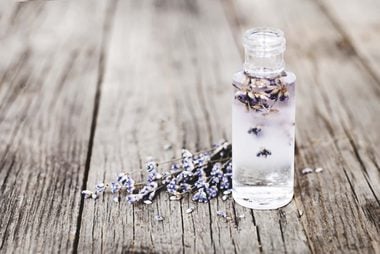
What are essential oils?
Before you start using essential oils—which can offer some surprising beauty benefits—you probably want to know exactly what the heck they are. Hope Gillerman, an essential oils expert and author of Essential Oils Every Day, says “These are the aromatic liquids extracted exclusively through steam distillation from the aromatic flowers, trees, fruits, grasses and leaves and tree resins that produce them. These intense liquids are so concentrated and evaporate so quickly that you can smell them from across the room.”
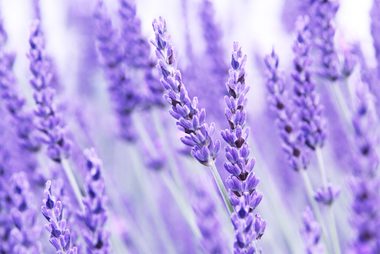
Where are the biggest misconceptions about oils?
Often when people hear “essential oils,” they think of a fragrance. But the oils can offer more than a perfume alternative—for example, some people have had success using them for easing allergy symptoms. But there are so many anecdotal uses that people need to use caution, says Gillerman. “Essential oils are more than just scent: They are herbal medicine in its most concentrated form. It takes a football field of lavender to make two gallons of essential oil; you need six dozen roses to make one drop of essential oil.” Gillerman said.
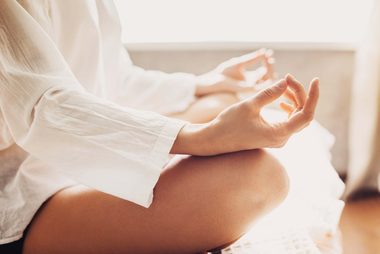
What are they generally used for?
Gillerman notes that, “People [….] have been using essential oils for thousands of years to ward of viruses, clean and heal wounds and resolve injuries, relax muscles, soothe the nervous system as well as focus the mind for contemplative thought and meditation and in religious ceremonies.”
While actual research on the medical uses of essential oil is spotty at best, Gillerman notes that people have tried “essential oils for skin care, to ease anxiety, reduce stress, focus the mind, support the immune system, and clean and scent our homes without toxic chemicals.” Some people have found them useful for getting a good night’s sleep. “They are even used in medical settings to help patients prep for surgery and deal with the stress of serious illness and its treatment,” says Gillerman.
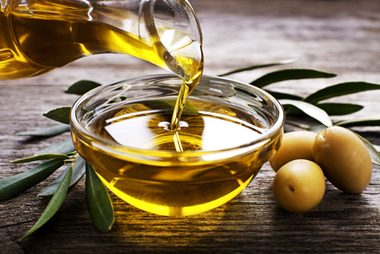
What is a carrier oil and why is it important?
When you first start experimenting with oils, the word “carrier oil” pops up quite a bit. A carrier oil is essentially a fatty oil (olive oil, jojoba oil, sesame oil, grapeseed oil, avocado oil, etc.) that aromatherapists use to dilute the oils so they can be applied to the skin, explains Gillerman. “Once diluted in a carrier, essential oils can be safely applied topically and will cover a larger area so you can use them as body oils or massage oils. They double as superior skin care for dry or sun-damaged or aging skin when diluted.” she says. Here are 11 essential oils that can take years off of your skin.
With essentials being so heavily concentrated, diluting them is essential to keeping them safe for everyday use. “Essential oils are so concentrated they can sometimes irritate the skin, like getting a burn from grass or wind; something normally gentle can be very harsh on skin in high concentrations. To make them gentler on skin, we dilute them and since essential oils are so concentrated and powerful, we can still experience results when diluted.”
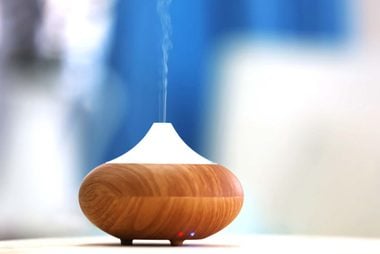
Different ways to use essential oils
There are endless ways to use essential oils, with using an essential oils diffuser being the most popular. Here’s a guide to choosing the best essential oil diffuser for you. But if you don’t want to have a diffuser running in your home, Gillerman suggests inhaling the appropriate oil—check out this list of oils and their uses—or apply them on your skin where you need them. Common trouble spots can be tense shoulders, an achy lower back, and sore feet (apply oil to the tops of your feet, your ankles and calves). For congestion, you can apply oils to your chest or right under your nostrils, above your upper lip.
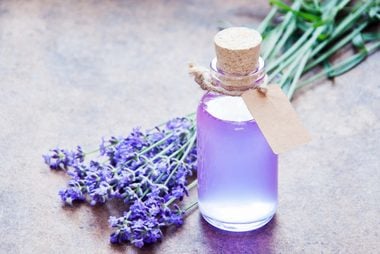
What is a neat oil?
Another term you’ll run across frequently in the essential-oil community, here’s how Gillerman explains it: “There are some oils that are gentle enough on skin, like lavender, that you can apply a drop on the skin, undiluted. This is what aromatherapists call a called ‘neat oil’—undiluted—but this is not recommended in general. When you increase the concentration of the essential oil, you would use it on a smaller area to target a specific problem (like back pain) and this would be considered a treatment oil (15 percent-strength essential oils). For skin care you dilute them more—down to 1.5 percent—because you use them every day and facial skin is more sensitive.” Speaking of sensitive, it’s possible to treat sunburn with essential oils.
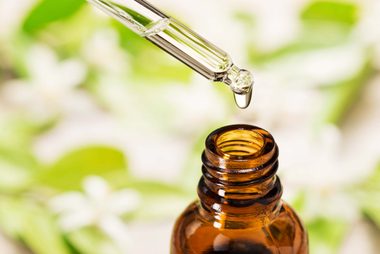
What is a sensitive oil?
Some oils are a little bit harsher than others and extra precautions should be taken when using them, especially directly on the skin. Gillerman shares that,”even diluted some oils still have the potential to irritate the skin, even if they are powerful healers.” Birch is an excellent pain reliever, she points out, and an experienced aromatherapist knows how to use it safely. But this sensitizing oil needs to be used in formulations that reduce the likelihood of irritating the skin. Using photo-sensitizing oils, like bergamot, coriander, or lemon and then going out in the sun can cause severe burns, she warns.
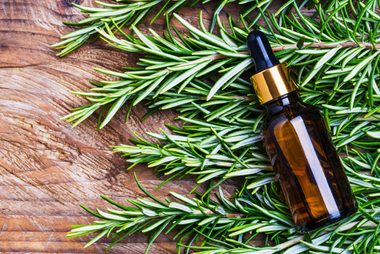
Choosing essential oils
If you want to experiment on your own, you can find essential oils for sale at the store and over the Internet; you can even get them through multi-level marketing companies, although Gillerman advises that you make sure you get certified organic products. She points out that these are not only produced without potentially harmful pesticides, they are safer to use because the organic regulations require the oil be pure. If you’re thinking about trying essential oils for acne, be sure to read this first.
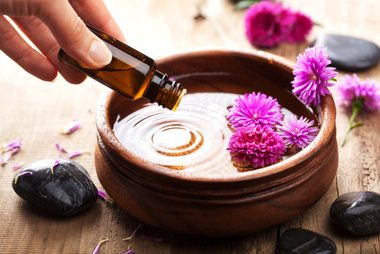
See an aromatherapist
For your first time out, make an appointment with someone famililar with the oils and their safe use, suggests Gillerman. That way you can avoid any bad reactions. She also warns that before using any new oil for the first time, you’ll want to make sure to test it out and see if your skin has an allergic reaction to it. “Though it’s uncommon, anyone can have an allergy to any essential oil. Always test an essential oil by putting a drop diluted in a fatty carrier oil in the crook of your elbow a couple times a day over a few days to see if your body reacts.”

Discarding essential oils
You might buy it in small quantities, but these oils are incredibly concentrated. If an oil expires or you don’t want it any longer, it’s important to discard it properly because they can be a fire hazard as well. Do not dump them down the drain, but instead treat them as if they are similar to paint thinner or a hazardous chemical and call your waste management center to see how these items are typically disposed of in your area.